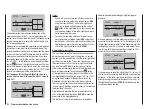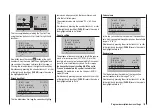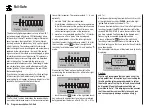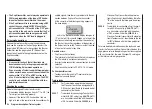
141
Program description: Telemetry menu
regard. The default setting for the HoTT receiver is
“HOLD” mode.
If interference should occur with hold-mode in force, and
if you are very lucky, the model aircraft will fly straight
ahead for an indefinite period and then “land” some-
where or other without causing major damage. However,
if the interference strikes in the wrong place and at the
wrong time, then a power model could become uncon-
trollable and tear wildly across the flying field, endanger-
ing pilots and spectators.
For this reason you really must consider whether you
should at least program the throttle to “motor stopped”,
to avoid the worst of these risks. If you are unsure of
this, please ask a competent model pilot for advice on
how to find a “sensible” setting for your model.
After that warning we present a brief description of the
three possible Fail-Safe variants offered by the
mx-16
HoTT transmitter:
The simplest way of setting Fail-Safe - and the one we
recommend - is to use the “
Fail-Safe
” menu, which is
accessed from the multi-function list; see page 136.
A similar alternative, albeit slightly more difficult to ac-
cess, is to use the “FAIL-SAFE ALL” option described on
the next double-page.
And finally there is the relatively complex method of
entering individual settings using the “MODE”, “F.S.Pos.”
and “DELAY” options. The description of this variant
starts below with the “MODE” option.
Value
Explanation
Possible settings
OUTPUT CH Output channel
(receiver servo
socket)
1 … according to
receiver
INPUT CH
Input channel
(control channel
coming from
transmitter)
1 … 16
MODE
Fail-Safe mode
HOLD
FAIL SAFE
OFF
F.S.Pos.
Fail-Safe position
1000 … 2000 μs
DELAY
Response time
(delay)
0,25, 0,50, 0,75
and 1,00 s
FAIL SAFE
ALL
Stores fail-safe
positions for all
control channels
NO / SAVE
POSITION
Displays stored
Fail-Safe position
between approx.
1000 and 2000 μs
OUTPUT CH (servo socket)
In this line you select the OUTPUT CH (receiver servo
socket) which is to be adjusted.
INPUT CH (input channel select)
As already mentioned on page 137, the eight control
functions of the
mx-16
HoTT transmitter can be
shared out between several receivers if necessary, or
alternatively several receiver outputs can be assigned
to the same control function; for example, you may wish
to be able to operate each aileron with two servos, or to
control an oversized rudder using two coupled servos
instead of a single one.
Sharing control functions amongst multiple HoTT receiv-
ers is a useful idea for large-scale models, for example,
to avoid long servo leads. In this case bear in mind that
only the last bound receiver can be addressed using the
“
Telemetry
” menu.
The eight control channels (INPUT CH) of the
mx-16
HoTT can be managed in the appropriate manner using
the facility known as “channel mapping”, i. e. by assign-
ing a different control channel in the INPUT CH line to
the receiver servo socket selected in the OUTPUT CH
line. BUT CAUTION: if, for example, you have entered
“2AIL” in the “Aileron/flap” line of the “
Base settings
”
menu at the transmitter, then control function 2 (aileron)
is already divided to control channels 2 + 5 for the left
and right ailerons. In this case the corresponding re-
ceiver INPUT CH, i.e. the channels to be mapped, would
then be channels 02 + 05; see the following example.
Examples:
You wish to assign two or more servos to each ailer-
•
on of a large-scale model aircraft:
Assign the two standard aileron control channels 2 or
5 as INPUT CH to the appropriate OUTPUT CH (ser-
vo sockets), maintaining the correct sequence for the
left and right wings.
You wish to control the rudder of a large-scale model
•
aircraft using two or more servos:
Assign one and the same INPUT CH (control chan-
nel) to each of the appropriate OUTPUT CH (servo
sockets); in this case the default rudder channel 4.
MODE
The settings you enter for the options “MODE”, “F.S.Pos.”
and “DELAY” determine the receiver’s behaviour if inter-
ference should affect the transmission from transmitter
to receiver.
The setting programmed under “MODE”
always
refers to
the channel you have set in the OUTPUT CH line.
The default setting for all servos is “HOLD”.
Summary of Contents for mx-12 Hott
Page 1: ...Programming Manual 33116 mx 16 HoTT 3 en mx 16...
Page 35: ...35 For your notes...
Page 49: ...49 For your notes...
Page 55: ...55 For your notes...
Page 59: ...59 For your notes...
Page 63: ...63 For your notes...
Page 69: ...69 For your notes...
Page 91: ...91 For your notes...
Page 101: ...101 For your notes...
Page 123: ...123 For your notes...
Page 181: ...181 For your notes...
Page 193: ...193 For your notes...
















































